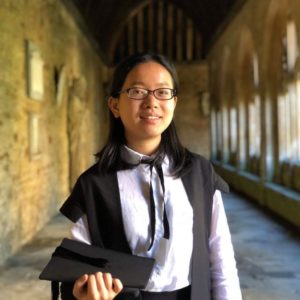As a sophomore, I’ve finally started to get better at navigating Princeton, and there are many perks that come with that. But at the same time, this is when things can start to feel monotonous. During the winter, I started to look for ways to rid myself of this feeling, and one of the ways that I thought of was to study abroad. This week, I decided to interview Leslie Chan, a junior in the molecular biology department, about her experience going abroad to Oxford University in her junior fall.
The Oxford-Princeton Biochemistry Exchange is a program where selected juniors from the molecular biology department exchange places with an Oxford student for a semester and do research in a laboratory setting — it’s distinctive in that the students don’t take classes at Oxford, but rather become full-time lab members at a Biochemistry laboratory at Oxford. You still get transfer credit though, so you get to graduate on time!
Here’s a bit of background on Leslie:

I am a junior majoring in molecular biology from New York City. On campus, I am a member of Ultimate Frisbee, a Matriculate Advising Fellow, Innovation chemistry editor, and a SIFP Head Fellow. I love to read, explore, and try out new things!
My lab at Oxford University studies viruses and cancer by leveraging a new experimental technique (RNA interactome capture) that my PI developed. I used this technique to study the function of tumor suppressors, or proteins that protect cells from becoming cancer, from a new angle.
Why did you decide to study abroad?
I was surprised myself that I chose to do study abroad. When I came in my first year I thought — “Oh, Princeton is so wonderful! I don’t want to leave since it’s only four years!”
But during my sophomore winter, I started to consider the possibility of going to a new place to travel and basically experience being a first-year all over again. I was also thinking about pursuing grad school and out of all the study abroad options, the Oxford program was the one that allowed me to do research full-time.
Did you have any previous research experience?
The summer right before I went abroad to Oxford, I did a research internship on gastric cancer at a university in China. The summer of my first year at Princeton, I did ReMatch+. It was in the chemistry department, so the topic that I worked on didn’t have any direct connection to my research at Oxford, but I got a lot more comfortable at asking questions and trying to gain ownership — understanding the background, why we’re using specific techniques — after that experience.
What did you learn about the research process while you were abroad?
I learned the most about planning my own experimental design. From my previous research experience, I knew that I wouldn’t get exciting results from just a short period of time, but it was still exciting because it was the first time that I got to have my own project from start to finish. This was also the first time I felt like a full-time member of the lab because I was there all the time — and that was pretty nice.
I also learned that it’s important to ask other people when you don’t know how to do something! I had to go ask people in other labs when I was working on advanced microscopy, since the people in my lab hadn’t done much work in that. Sometimes I would feel bad when I couldn’t get something to work for the second time, but everyone was very nice.
I’ve also realized how important it is to like your lab supervisor and the other people in your lab — that’s something that I’ll keep in mind when I apply for graduate school.
How has your experience abroad translated into your research here?
I’ve only started working in my thesis lab this semester, and the work that I’m doing isn’t very related, but just in general, having experience reading papers and designing experiments is useful. After this study abroad experience, I finally feel like I’m thinking like a scientist.
What would you say to people who are on the fence about going on study abroad?
Keep in mind that other people who also went on this same exchange had vastly different experiences. Who you choose as your principal investigator, the mentoring style of your supervisor — many different factors contribute to your experience!
I was unsure myself about going on study abroad, but I decided to go because I was really convinced by everyone that I talked to. I would encourage someone to still apply even if they are unsure and to just keep talking to people, to try to figure out if they want to do it or not.
I personally am a global ambassador for the Office of International Programs, so I would be happy to chat with anyone who’s curious.
For me, it was definitely worth it.
–
I’m definitely considering going abroad next year, but deadlines are quickly approaching! If any other sophomores are also interested in going abroad, I recommend that you go talk to an advisor at the Office of International Programs and start looking online for options!
—Nanako Shirai, Natural Sciences Correspondent

